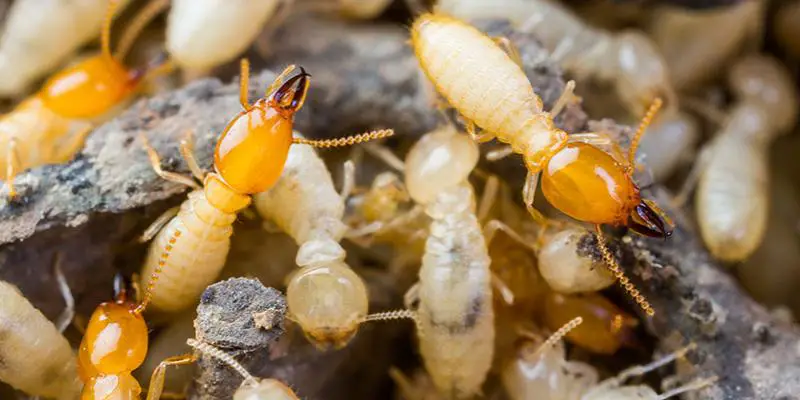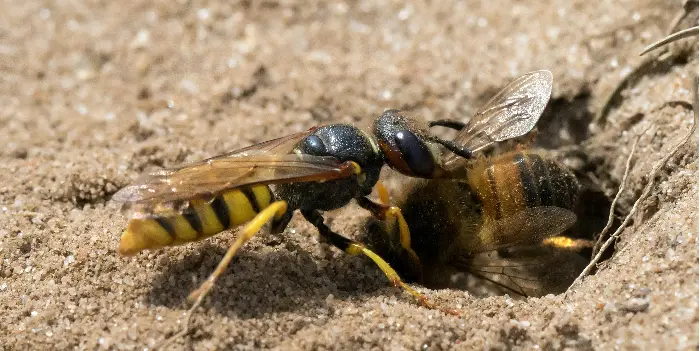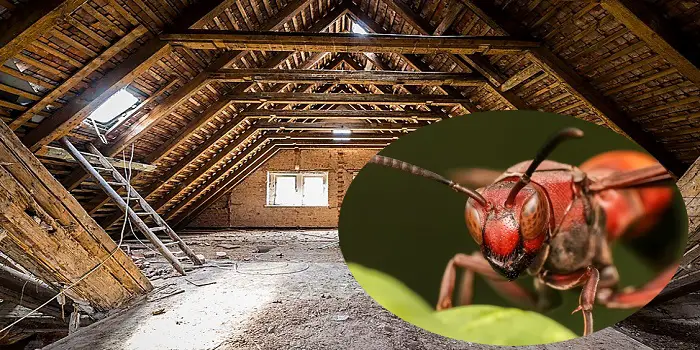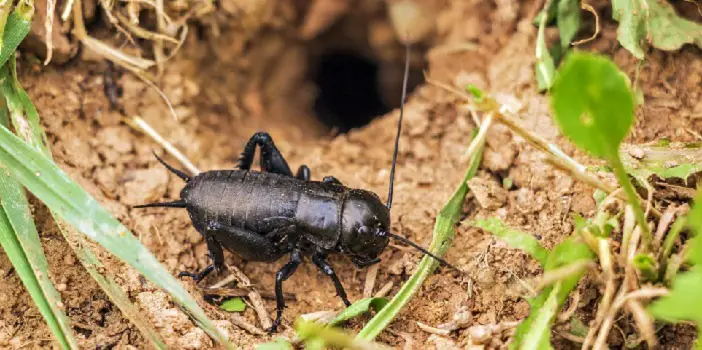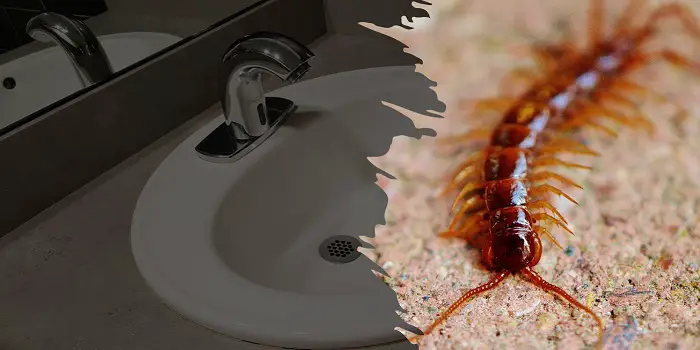
Although not as common as cockroaches or ants, centipedes are a common household invader.
While centipedes are more at home outdoors, they can come inside through the sink and drains in your kitchen or bathroom when looking for food, namely other bugs.
Centipedes come in several different colors and will bite if they feel threatened.
And while the bite does not cause permanent damage, it can be painful.
Although centipedes may seem harmless, they do present an issue when they take permanent residence in your home.
Before you plan to call a professional pest expert to eliminate these insects, there are some things you can try first to prevent them from entering your home.
So, let’s discuss some of these ways in the article below.
But before that, first, it is important to find them where they are hiding and make sure they are centipedes.
Detecting Centipedes
One reason why many people believe that centipedes are not home pest is that they do not see them.
This is because nocturnal creatures come out and hunt at night.
During the day, centipedes tend to find out-of-the-way places, which makes them difficult at first to know if they are in your home.
In addition, even if they were present during the day, you still may not see them because they move so fast.
They need to be that fast because of the prey that they seek, which includes the following…
- Ants
- Earwigs
- Flies
- Silverfish
- Spiders & More
Centipedes prefer dark, damp spaces and easily squeeze their bodies through cracks and holes.
If you suspect their presence in drainpipes, sinks, or gutters (due to blocked or holding stagnant water), use a flashlight to check them thoroughly.
The simplest way to get rid of centipedes in the drain is by pouring a cup of white vinegar down the drains and sink pipes.
If you prefer, add half a cup of baking soda first, which will create bubbling (because of carbon dioxide released).
This will move the centipedes out and can keep the bugs away.
How to Prevent Centipedes from Coming?
The presence of their prey inside the home is one reason to suspect that centipedes may be present.
In addition, centipedes prefer humid and warm environments, such as basements, bathroom sink, kitchen drains, and inside walls near pipes, floorboards, or the water heater.
If you see a centipede, you can rest assured there are more in your home.
But even if you do not see one, there are safe methods you can use to both drive them from your residence and keep them away forever.
1- Clean Up the Clutter
Look around your home and remove any clutter that the centipede might call home during the daytime hours.
This means any trash, rocks, leaves, or materials in which some openings allow centipedes to rest during the day.
If you have items that cannot be moved or are necessary for your home, such as firewood, sprinkle the area with cedar chips.
Cedar is a natural repellent for many insects, including centipedes.
2- Cut Off their Food Supply
Centipedes are predators.
So, if you take away their food supply, the centipedes will have no reason to enter your home.
This means identifying the type of insects that centipedes target and what food they eat as well, so the prey does not bring in the centipedes.
- Flies: Getting rid of flies will also dissuade spiders, both of which are consumed by centipedes
- Ants and Silverfish: Keep kitchen sinks and floors clean of food
- Earwigs: Remove rotting vegetation and piles of wood
Doing these things will thin out the food supply of the centipede in your home.
3- Lower Humidity Levels
Centipedes prefer humid environments with little ventilation.
That’s the reason they prefer coming up the drain and then crawling through your bedroom or living room.
Identify the areas in your home prone to high moisture levels and dehumidify them.
You can do this by running fans or purchasing dehumidifier units.
This will make your home less friendly to these ugly bugs with many legs.
4- Seal Up Entrances
The centipedes cannot get in without a way to make it inside your home.
Check all the entry points and locate any spaces in which the centipedes might enter.
Once you have identified possible places to get inside, the next step is to seal them using one of the following methods.
- Brickwork: You may need to repoint the brickwork to stop the cracks from occurring
- Caulking: Perfect for small holes, cracks, and separations
- Expandable Foam: For larger holes, cracks, and separations
- Vents: Cover all vents with mesh that lets the air in or out but keeps insects from entering
One of the most common ways centipedes enter the home is through the drains, most notably in the kitchen and bathroom.
You will need to check your drains and seal any holes or tighten loose fittings.
This is a good time to call a professional plumber to inspect the drains and eliminate any leakage or blockage that might interfere with their use.
5- Traps
Simple traps that use sticky tape will not only trap the centipedes but their prey as well.
Put the traps near entrance-ways, windows, and the drains for maximum effect.
Once you have prepared your home, you can use various repellants and insecticides that will either drive away or kill centipedes.
6- Boric Acid
This is one of the safest ways to kill centipedes, because it is highly effective and because boric acid does not affect humans or pets.
So, you can sprinkle it wherever you need – like the kitchen drains, bathroom, and even near your bed.
Keep in mind that centipedes will not die instantly.
What happens is the centipede will ingest the acid, which cannot be excreted.
The result is that the centipede starves to death because it cannot consume nutrients.
While it will take a few days for the boric acid to do its job, it is quite effective and safe to use.
7- Cedar Oil
A natural insecticide, cedar oil is not only good against centipedes but also affects the many insects which the centipedes consume.
The process in which it eliminates the centipede is rather gruesome as it causes them to dehydrate and suffocate, and will finally emulsify their body fast, eventually putting the centipede out of its misery.
You can safely use the cedar oil inside the home and particularly around entryways such as the drains.
However, since the oil tends to dissipate quickly outside, it is best to use cedar wood chips around the garden and yard.
Cedar chips are also great for the doghouse, helping control fleas and ticks.
8- Cayenne Pepper
Because cayenne pepper contains capsaicin, it is one of the best repellents of centipedes along with many other insects.
This is because some insects generate capsaicin as a defense mechanism that warns predators to stay away.
Because it is so effective, sprinkling a little cayenne pepper at the entryways of your home, including doors, windows, and other places where the centipede can enter, will help keep them away.
The only downside is if you have pets who might sniff up some of the capsaicin, which can be unpleasant for them.
9- Diatomaceous Earth
This substance looks like a powder, but it is a collection of tiny seashells that have been fossilized.
While harmless to humans, it destroys centipedes thanks to their small, sharp sides that cut into the exoskeleton and cause moisture to leak out.
You can sprinkle this substance around your home, particularly in places where the centipedes may enter, such as entranceways, windows, and especially around the drains of your kitchen and bathroom.
The only precaution is wearing a respirator while sprinkling this substance, so it does not get into your lungs.
Once applied, it is safe around humans and pets and should not cause harm.
10- Dish Soap
If you want to use a cheap, safe insect repellant that works well on centipedes, then a combination of dish soap and water will do the trick.
When the exoskeleton of the centipede is touched by soap, it causes dehydration, killing the insect.
It works on many different types of insects as well.
Simply mix two or three tablespoons of dish soap per gallon of water and pour the mixture into a spray bottle.
Spray any area where centipedes might cross.
In the kitchen or bathroom, you’ll want to spray near the drains as they might enter the home from that access point.
Other places include doors, windows, and all other entryways into the home.
If you see a centipede, you can spray it directly on them.
11- Neem Oil
This is an essential oil used by plants to ward off attacks by insects.
And while centipedes primarily hunt other insects, it works against them as well.
Neem oil is commonly used as an insecticide and works quite well, although in a different way than you might suspect.
Instead of directly killing the centipede, when the oil is ingested, it causes an imbalance in their hormonal system.
The result is that the centipede does not eat or mate, so they die quickly without leaving any offspring behind.
You can use this substance around the home in places where they might enter, like the drains and sink.
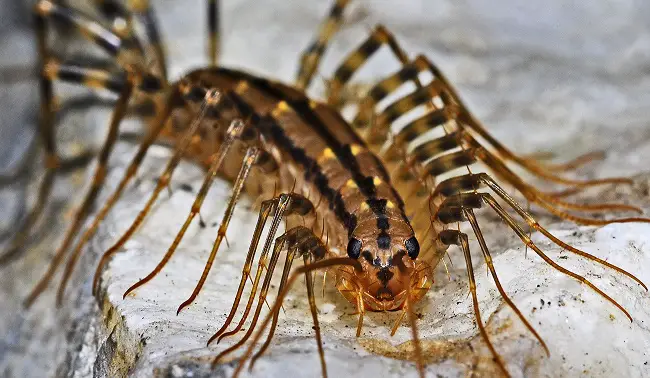
What are House Centipedes?
Centipedes (also called house centipedes) are crawling worm-like bugs that are found all around the world, including in the United States.
They are generally yellowish to dark brown and can live from anywhere between a year to up to six years.
Some of them also have darker stripes or markings all through their body.
You can identify them by their elongated, worm-like body with many pairs of legs.
Centipedes can have anywhere from 15-177 pairs of legs which is why they are also referred to as “hundred-leggers.”
On their head, they have a pair of long sensitive antennae which are mostly covered with dense hairs.
How do they kill their prey?
To capture and subdue prey, centipedes are provided by large, claw-like structures beneath their head.
These contain venom glands and are also known as poison claws.
With these powerful claws, centipedes grasp their prey and inject the poison into their body.
Later they wrap their prey up with their many legs for killing and eating.
Why Killing Them is Not the Best Option?
Centipedes have many legs and can travel at 1.3 feet per second.
For this reason, it’s nearly impossible to catch them for most people.
House centipedes are also known for killing many unwelcoming pests in your house (like moths, flies, roaches, silverfish, termites, and other soft-bodied insects).
The good thing about these active hunters (that kill the worms in your house) is they do not create any kind of webs or nests in your house.
They also DO NOT carry diseases or eat the wood in your home – they are only after preying the bugs for a good reason.
Although house centipedes prove beneficial, they can leave behind stains on your floor if you crush them while walking in your home.
If you really do not want to see them around or want to keep them away, you can remove them with a vacuum (without actually killing them) or try the methods I discussed above.
Besides the above ways, spraying scents that centipedes hate can also help you keep them off.
Some of these smells include essential oils (like lavender, vanilla, peppermint, tea tree, citrus, eucalyptus) and herbs (like mint, garlic, onion, basil, etc.).
How Are Centipedes and Millipedes Different?
The main difference between centipedes and millipedes is that their legs are located differently on their body.
While centipedes have one set of legs per segment positioned on the side of their body, millipedes are known to have two sets of legs per segment positioned under their body.
If you look at both sides, centipedes will appear to have a flatter body, while millipedes will be more rounded.
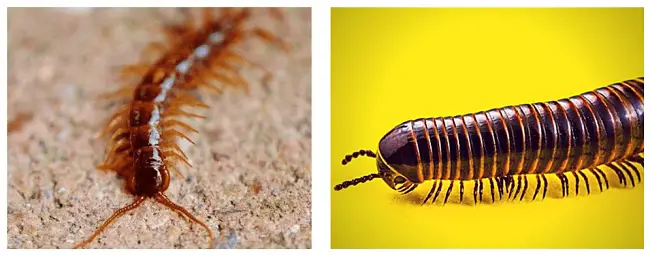
| Centipedes | Millipedes |
|---|---|
| Long antennae | Short antennae |
| Runs very fast | Walk/crawl slowly |
| Can bite | Do not bite |
| Predatory (Mostly eat insects) | Scavengers (Mostly feed on decomposing plants) |
| Injects venom to paralyze/kill prey | Release smelly secretion to drive off predators |
Other Related Questions:
What is the deadliest centipede?
Scolopendra Subspinipes (often referred to as giant centipede) is a centipede species that is known to cause extremely painful sensations after they transmit venom.
Although it is known to cause fatalities in the past, the outcomes are known to be very uncommon.
Few other most dangerous centipedes include:
- Amazonian giant centipede
- Giant desert centipede
- Giant Scolopendridae
- Scolopendra Cataracta
- Scolopendra cingulata
- Scolopendra Galapagoensis
- Scolopendra Morsitans
Why do centipedes crawl on your bed?
One most prominent reason why a centipede gets attracted to your bed is the bed bug infestation.
Bed bugs sometimes hide in your bedding, mattresses, and pillows to feed on your blood.
The presence of these small insects in your bed means that centipedes are provided with a steady supply of their favorite food if they stay there.
What can kill centipedes instantly?
If you want to kill a centipede instantly inside or outside your home, you can try spraying it with TERRO® Spider and Ant Killer.
Windex may also work as an instant killer for a few centipedes. So, you can try them instead.
Can you die from a centipede sting?
House centipedes rarely bite humans, and therefore they aren’t very dangerous to people.
But keep in mind, if provoked, they can sting and can cause pain along with swelling and redness.
The larger the centipede, the more painful their bite can be. Worry not. They are not deadly!
Just wash the wound and apply a cold compress.
In most cases, painful symptoms go away on their own within 48 hours.
However, if the infection persists, you may need to visit a physician to get antibiotics and other medications.
The Conclusion
By following these tips, you can make your home less inviting to these grey bugs with many legs.
Not only will you keep the centipedes away, but you will also remove other unwanted pests from your home.
And, you will not have to spend a fortune to do so.
If you should see one, remember not to handle it as they can bite.
Instead, remove any centipedes using thick gloves while wearing long sleeves.
When you finally trap a centipede or kill it, a little care will go a long way towards protecting you and your family from them.
Share the post "How to Keep Centipedes from Coming Up the Drains and Sink?"

Welcome to ProShieldPest.com. I am Tina Jones. I have been working as a pest removal professional in Winslow, Arizona lately. At present, I love to spend my time with my family as a retiree.
Here I share all my knowledge and experiences to help people understand better how they can stop pests at their homes without actually killing them. Hopefully, the information you will find here will help in safeguarding your home! You can check more about me here.

